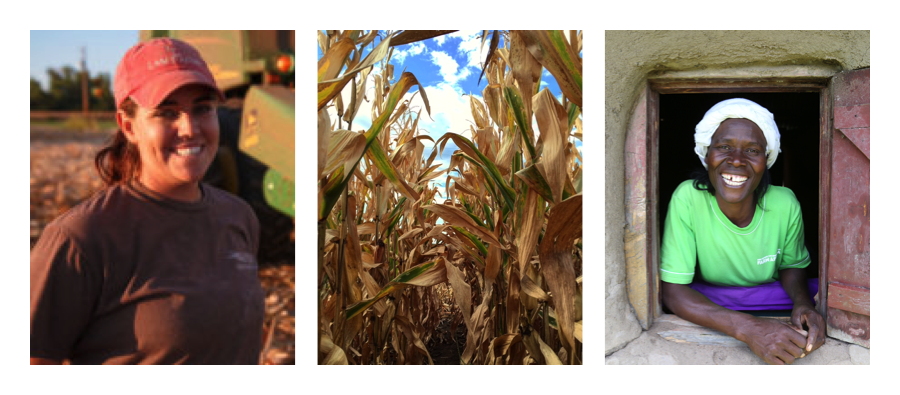Whilst many challenges facing Farming First’s supporters can vary from region to region, we also stand to gain much from sharing our common experiences, to identify relevant solutions. With this in mind, we recently interviewed farmers from opposite ends of the world, to find out which concerns and interventions – if any – they shared.
Beatrice Wakwabubi, a Kenyan farmer with Farm Africa’s Growing Futures initiative, and Jean Lam, a member of the National Farmers’ Union in the US, who works a no-till operation in Oklahoma, US, may seem to have little in common. But like many farmers in today’s uncertain climate, both women told Farming First that financing, rising costs and land access were their main concerns.
Beatrice called on her government to offer better financing options for smallholders to lease or buy their land, thus giving farmers greater security and incentives for investment. Jean added that as competition for land increased and farms continued to expand to remain competitive, young farmers would need low interest loans to incentivise them. Although their own experiences were vastly different, their concerns showed two sides of the same coin.
At the same time, a major challenge for Beatrice is the fertility of her soils as she diversifies and begins to grow French beans. A good way of avoiding preserving soil health is no-till farming, a practice that has already yielded results for Jean.
The scale of their farms, access to credit and markets, and environmental conditions may be greatly different. But today’s farmers also face many of the same challenges and can learn much from one another. Read the full interview with Beatrice and Jean below.
FF: Tell us what inspired you to become a farmer?
Beatrice Wakwabubi: I needed money to help me with the necessities of day to day living. I couldn’t find a regular job and needed a way to make do. I spoke to my father who had a farm and he let me have a part of his land from September after he had harvested maize. I could use the land for about five months to plant crops and sell to make some money. The money was my motivation.
Jean Lam: My family has been farming since the early 1900s in the same area of Oklahoma I currently farm. As a fourth generation agriculturalist, being a good steward of the land is deeply engrained into my identity. I am inspired to continue the legacy given to me by my family and to leave the land better for future generations.
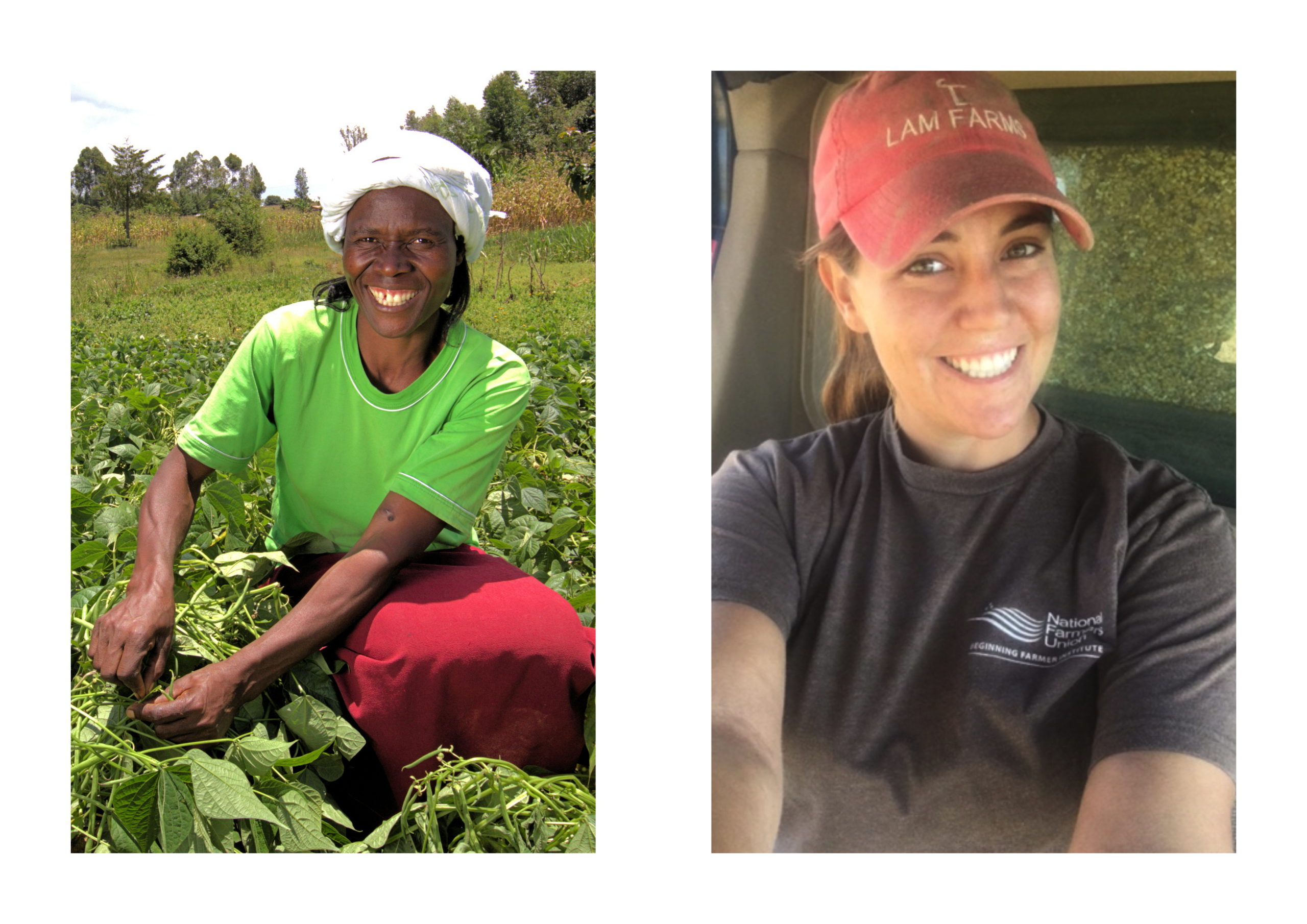
Beatrice Wakwabubi (left), 34, of the Songea Group, and Jean Lam, 26, of Lam Farms, Oklahoma, US.
FF: What do you grow or raise on your farm? How was your last harvest?
BW: On the current farm I have, which is a leased 0.1 acre plot, I have regular beans at the moment. Normally I plant French beans, kale, cabbage and tomatoes. My last harvest of tomatoes was from 0.5 acres of land which my father let me use. I got 2 crates and sold them at Ksh1,500 (US$14.50) per crate. I lost another 1.5 crates due to pests and post-harvest damage.
JL: Lam Farms is a dryland no-till row crop operation that grows alfalfa, corn, soybeans, and wheat. We also raise commercial beef cattle in a cow/calf herd. 2016 had above average yields due to rain and a mild winter.
FF: What poses the biggest challenge to your farming?
BW: Our soils do not have good fertility since they have been overused. The cost of labour is also high and it is already a challenge leasing land since we have no access. Many youth do not own land and they have to lease or ask for any available space to use, and these spaces are normally small.
JL: Depressed commodity prices and raising input costs. Also, in my area, access to land is competitive as farms are having to increase in size to stay in business.
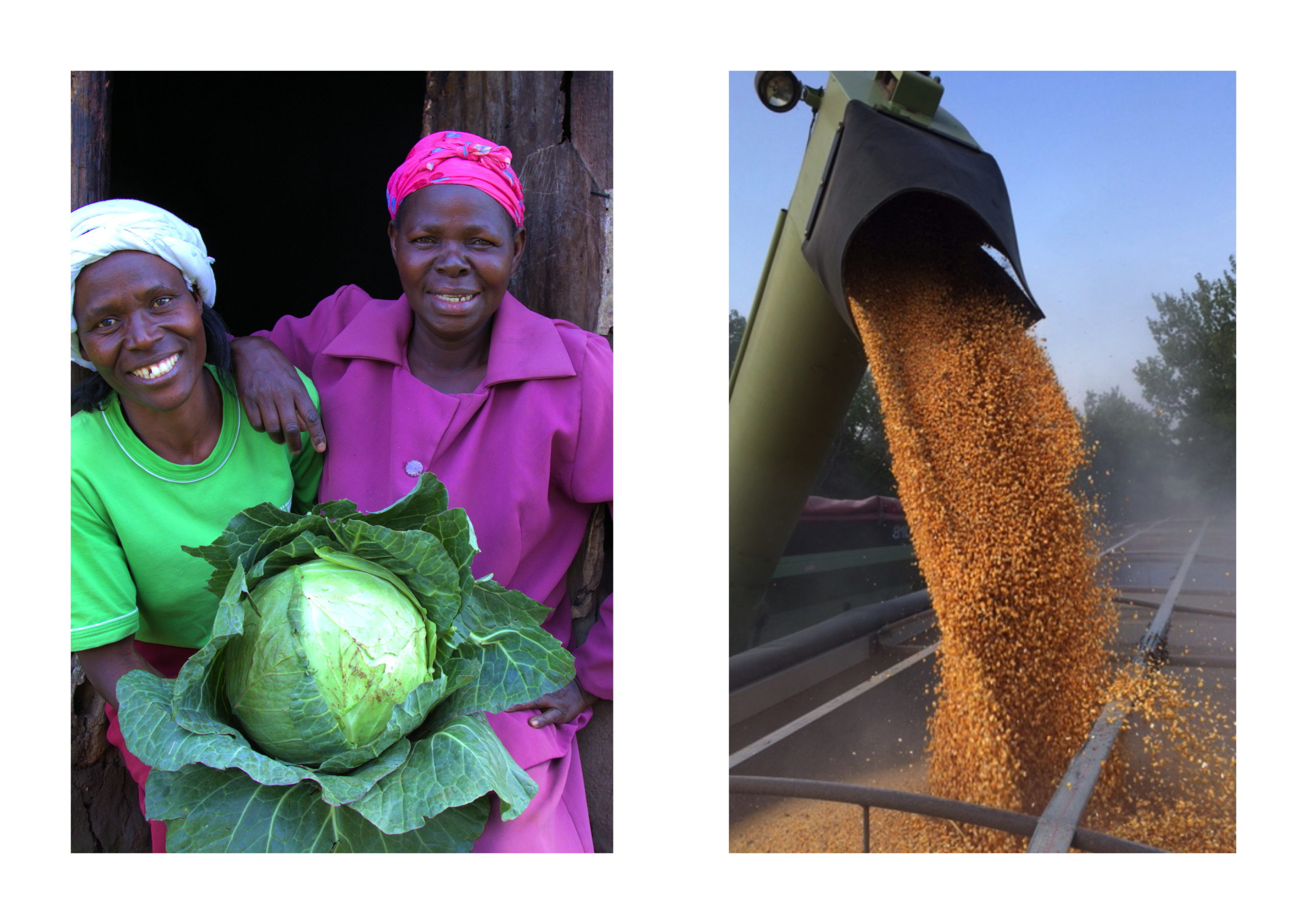
Beatrice shows off a cabbage (left) while Jean’s harvest was better than average last year.
FF: And how have you been able to overcome this?
BW: We normally have to come together as groups and put together some money. In a group of 20 people for instance, three people can borrow money, which they pay at 10 per cent interest in two months and with this cash they can lease some land. Although it takes time for the rest of the members to get their turn, we have no option.
JL: Transitioning into a complete no-till operation has considerably helped cut down on input cost such as labor, fuel, equipment maintenance, along with the amount of fertilizer and herbicides we must apply. To help combat the lack of available land in my area I cooperatively farm with other producers. We share labor and equipment as well as purchase chemical and seed in bulk to save money.
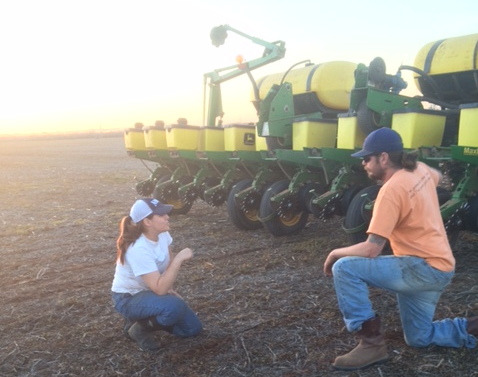
Both Beatrice and Jean said cooperation among farmers helped share the burden of cost.
FF: What kind of support do you need for your farm to thrive?
BW: We need access to finance, or some sort of capital to be able to lease as individuals or as group members. We can work to the point where we own our own farms. Usually what we get, for instance 0.1 acres, is not nearly enough.
JL: I’m lucky to have an amazing family support system that believes in my dream to pursue agriculture. My father is my mentor and business partner, without him the farm would not only not thrive but it would cease to be in operation. His continued support and advice has made my career choice a reality. From a business standpoint, the continued access to low interest rate loans is critical for beginning farmers such as myself to be able to expand our operations.
FF: Which equipment or inputs couldn’t you live without? (Or which do you wish you had)
BW: A generator to pump water for irrigation especially in the current dry weather we have this season. Without water our crops can never make it.
JL: The use of GPS satellite technology (i.e. auto-steer) has made precision farming a staple on our farm. Being able to grow more bushels per acre, more efficiently, has not only helped my farm be more economically sustainable but improves the quality of the land by precise application of herbicides, pesticides, and fertilizers.
FF: What are you excited about next for your farm?
BW: I am excited about being able to plant French Beans. This has good returns as I have seen for other farmers and I cannot wait to try it on the 0.1 acres I have.
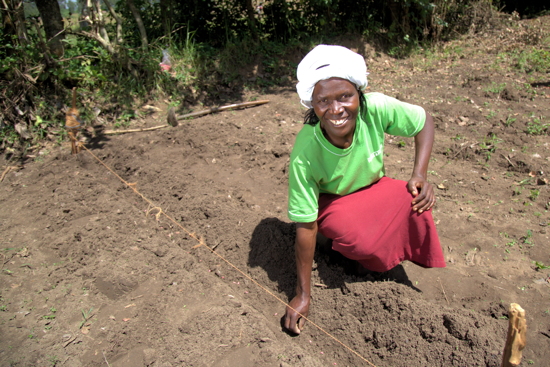
Beatrice is looking forward to growing French beans after seeing high yields for other farmers.
JL: Expanding my commercial beef herd and implementing “value-added” practices. I’m excited to integrate rotational grazing with my covercrop regimen to have my enterprises become more reciprocal.
FF: If you had five minutes with your agriculture minister, what would you say to him/her?
BW: I would ask him to help youth access farms and also loans to buy or lease these farms. With these farms, we can work and pay back the loans as we also make money. I would also ask for the farms to undergo soil testing so that we can improve fertility. For the produce we get, I would also like to have more market options with good prices.
JL: I would like to gain a better understanding of where my Secretary of Agriculture prioritizes demanding agriculture have a seat at the table when policies impacting agriculture are being decided. Judicious policies pertaining to issues such as immigration, food security, trade deals, climate change etc. are paramount to our industry. The sustainability of farming in a responsible manner will be impacted by impractical rulings if the voice of agriculture is not heard. I would like for him to know that as farmers we are feeding more people on fewer acres and this noble profession is becoming increasingly difficult to pursue and nearly impossible to enter into.
Photos: Farm Africa/Tara Carey; Jean Lam
